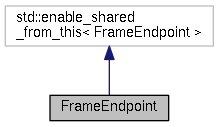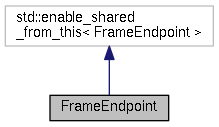|
HDLC-Daemon
|
|
HDLC-Daemon
|
Class FrameEndpoint. More...
#include <FrameEndpoint.h>


Public Member Functions | |
| FrameEndpoint (boost::asio::io_service &a_IOService, boost::asio::ip::tcp::socket &a_TcpSocket, uint8_t a_FrameTypeMask=0xFF) | |
| The constructor of FrameEndpoint objects. More... | |
| ~FrameEndpoint () | |
| The destructor of FrameEndpoint objects. More... | |
| void | ResetFrameFactories (uint8_t a_FrameTypeMask=0xFF) |
| Forget all provided frame factory callbacks. More... | |
| void | RegisterFrameFactory (unsigned char a_FrameType, std::function< std::shared_ptr< Frame >(void)> a_FrameFactory) |
| Register one subsequent frame factory callback. More... | |
| bool | GetWasStarted () const |
| A getter to query whether this frame endpoint entity was already started. More... | |
| void | Start () |
| Start the frame endpoint entity. More... | |
| void | Shutdown () |
| Tear a frame endpoint entity down. More... | |
| void | Close () |
| Close the frame endpoint entity. More... | |
| void | TriggerNextFrame () |
| Trigger delivery of the next incoming frame. More... | |
| bool | SendFrame (const Frame &a_Frame, std::function< void()> a_OnSendDoneCallback=nullptr) |
| Enqueue a frame for transmission. More... | |
| void | SetOnFrameCallback (std::function< bool(std::shared_ptr< Frame >)> a_OnFrameCallback) |
| Provide the callback method for handling of incoming frames. More... | |
| void | SetOnClosedCallback (std::function< void()> a_OnClosedCallback) |
| Provide the callback method for handling of connection aborts. More... | |
Class FrameEndpoint.
This is a convenience class to take full control over a provided connected TCP socket in order to receive and transmit used-defined frames. The user has to provide callbacks to be notified on reception of incoming frames and to be notified if errors occur. Thus, this class offers a fully asynchronous interface.
Frame objects representing received frames are created internally. For this purpose, the user has to register frame factory callbacks. These frame factories are selected according to the received stream of bytes and offer a very easy interface to the user. Currently, this frame selection scheme requires that the type of frame can be determined by evaluation of the very first byte of a frame. If this is not possible, e.g., because multiple types of frames exist which differ in "later" bytes, this FrameEndpoint class is not suitable!
Definition at line 65 of file FrameEndpoint.h.
|
inline |
The constructor of FrameEndpoint objects.
All internal members are initialized here. The ownership of the provided TCP socket is transferred, so the user MUST NOT perform any operations on it after registration.
| a_IOService | the boost IO service object |
| a_TcpSocket | the connected TCP socket |
| a_FrameTypeMask | the mask used while looking at the "first byte" of each frame to determine its type |
Definition at line 76 of file FrameEndpoint.h.
|
inline |
The destructor of FrameEndpoint objects.
On destruction, it is assured that the provided TCP socket is closed correctly. No subsequent callbacks are triggered.
Definition at line 93 of file FrameEndpoint.h.

|
inline |
Close the frame endpoint entity.
Invoking this method will instantly stop reception of incoming and transmission of outgoing frames. Frames pending in the send queue will be lost. No problems arise if this method is called multiple times. Consider calling Shutdown() instead.
Definition at line 181 of file FrameEndpoint.h.

|
inline |
A getter to query whether this frame endpoint entity was already started.
| true | the frame endpoint is currently running |
| false | the frame endpoint is currently not running |
Definition at line 137 of file FrameEndpoint.h.
|
inline |
Register one subsequent frame factory callback.
With each call of this method one subsequent frame factory is registered to the set of active frame factories. Each provided frame factory has to be tagged with a frame type byte. The frame type byte corresponds to the first byte of the serialized frame and must allow a distict mapping to the correct frame type and thus the correct frame factory.
| a_FrameType | the frame type together with the frame type mask must match to activate the respective frame factory callback |
| a_FrameFactory | the frame factory callback that is invoked if the frame type matches |
Definition at line 123 of file FrameEndpoint.h.
|
inline |
Forget all provided frame factory callbacks.
This method is used to clear the list of provided frame factory callbacks. After this, a new and completely different set of frame factory callbacks can be provided together with a changed frame type mask. This allows changing the user-defined protocol regarding a TCP socket for which a different protocol was specified earlier.
| a_FrameTypeMask | the mask used while looking at the "first byte" of each frame to determine its type |
Definition at line 108 of file FrameEndpoint.h.
|
inline |
Enqueue a frame for transmission.
Use this method to enqueue a frame for transmission. The user can select between quasi-synchonous and asynchronous behavior. In the first case, one has to evaluate the return value to check whether a provided frame was accepted or denied due to a full transmission queue. For asynchronous behavior the user has to provide a callback method on a per-packet basis that is called after the frame was successfully transmitted. Currently this callback method is only called on success but never on error, e.g., if the socket is closed.
| a_Frame | the frame to send |
| a_OnSendDoneCallback | a callback to be invoked if this frame was sent |
| true | the frame was successfully enqueued |
| false | there was a problem enqueueing the frame |
Definition at line 238 of file FrameEndpoint.h.

|
inline |
Provide the callback method for handling of connection aborts.
The user should provide one callback method to be able to handle error events such as a closed TCP socket.
| a_OnClosedCallback | the callback method that is invoked on error or if the socket was closed |
Definition at line 282 of file FrameEndpoint.h.

|
inline |
Provide the callback method for handling of incoming frames.
The user should provide one callback method to be able to handle incoming frames. For each incoming frame the callback method is called once.
| a_OnFrameCallback | the callback method that is invoked on reception of incoming frames |
Definition at line 272 of file FrameEndpoint.h.
|
inline |
Tear a frame endpoint entity down.
This method should be called instead of Close() if you want to assure a proper teardown sequence of the provided TCP socket. This assures that all frames enqueued for transmission are delivered before the socket is closed. You SHOULD NOT call Close() anymore, as this is performed internally as soon as the send queue becomes empty. You SHOULD NOT send subsequent frames after calling this method as you'll get no feedback whether the respective frame will be transmitted or not.
Definition at line 172 of file FrameEndpoint.h.
|
inline |
Start the frame endpoint entity.
The frame endpoint starts reading data from the socket and creates a stream of frame objects according to the provided frame factory callback methods. Frames enqued for transmission are delivered in sequence. Be sure that you DO NOT call this method twice, i.e., on a frame endpoint entity that is already running. This will trigger an assertion.
Definition at line 147 of file FrameEndpoint.h.

|
inline |
Trigger delivery of the next incoming frame.
Invoking this method triggers read and delivery of the next incoming frame. This allows an asynchronous processing of frames. For such an asynchronous mode of operation, the provided OnFrameCallback must return the value "false" in order to stop automatic delivery of subsequent frames. This provides unlimited time to consume a frame and stalls the TCP socket, but requires a later call to this method in order to continue receiving the next incoming frame.
Definition at line 200 of file FrameEndpoint.h.
